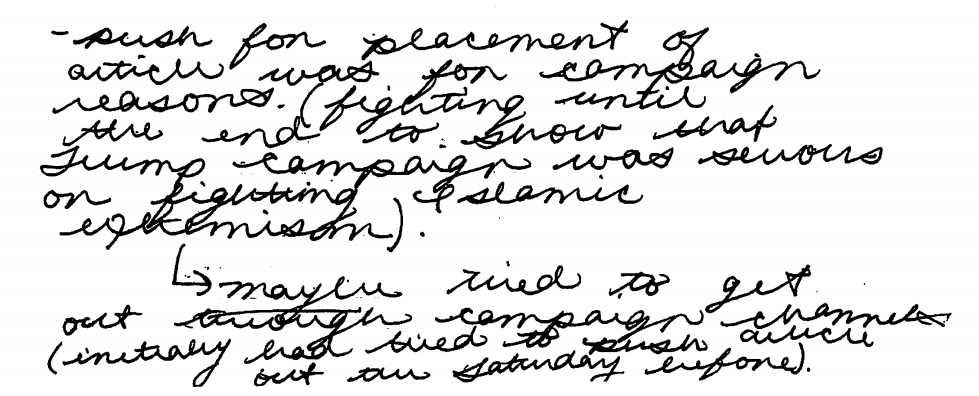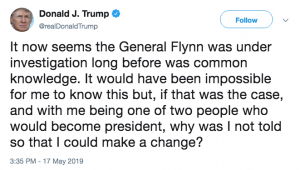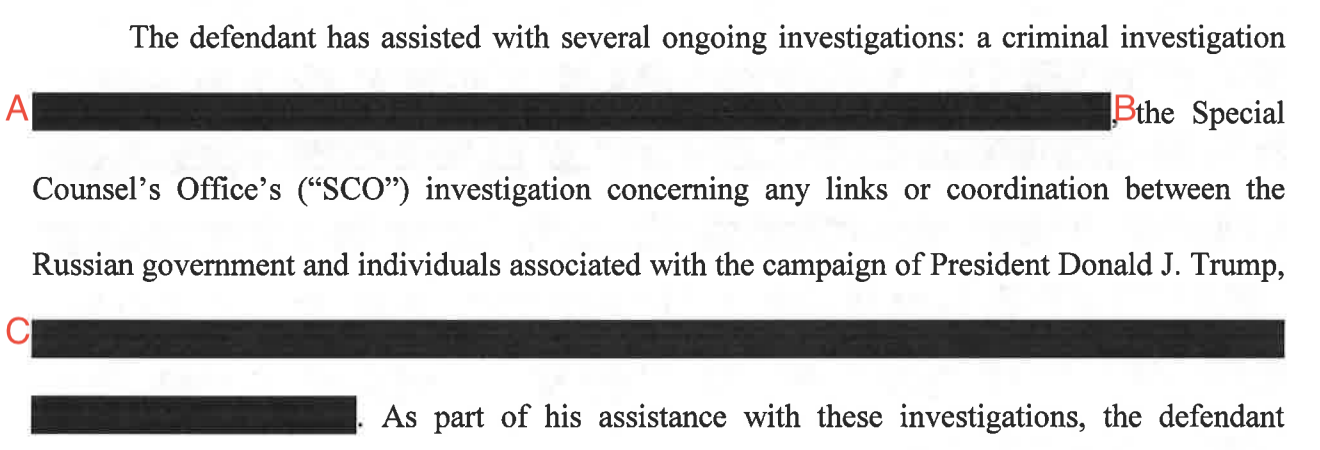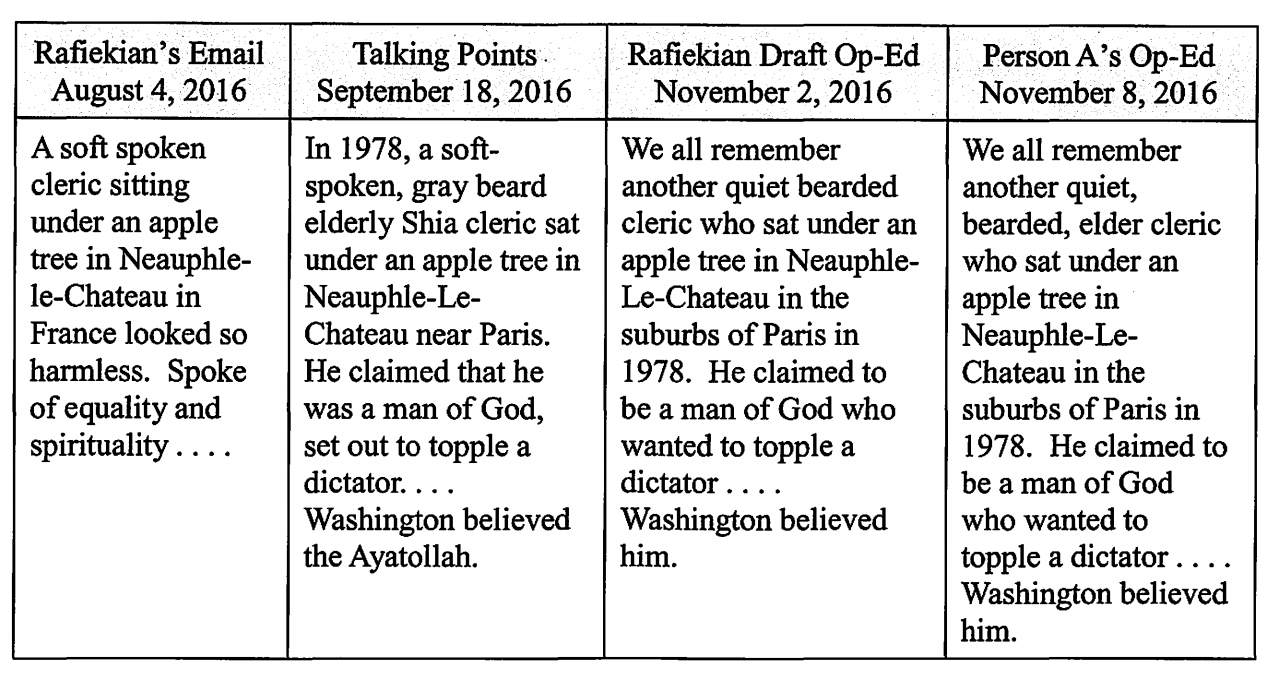With Latest Stunt, Mike Flynn May Save Bijan Kian from Prison Time But Double His Own
When Mike Flynn hired new counsel, it became clear he was … up to something. Now that something might get him — and possibly even his son (concerns about whom motivated Flynn to cooperate in the first place) — sent to prison. Or, it might spectacularly fuck over the government. We’ll find out next week, when Flynn’s former partner Bijan Kian goes on trial … or maybe sooner, given that Emmet Sullivan has demanded details on the backstory before the end of the week.
Filings unsealed in Kian’s case make it clear that, since the time Flynn replaced the very good Rob Kelner with Fox News firebreather Sidney Powell and Jesse Binnall, he reneged on a key part of his guilty plea. He newly claimed to prosecutors that that he had not knowingly lied about working for Turkey in the March 7, 2017 FARA filing that admitted Turkey might benefit — but denied they were paying for — his services. In response, the government has informed Kian they will not have Flynn testify at trial, and instead tried to name him a co-conspirator and submit one of his statements as the statements of a co-conspirator. That led to the unsealing of these documents, with Kian trying to prevent the government from upending their defense strategy, which has consisted of portraying Flynn as a liar, and Flynn trying to prevent the government from designating him a co-conspirator. Last night, Judge Anthony Trenga ruled largely for Kian on a bunch of other matters (which may have interesting effects for FARA and 951 prosecutions in EDVA); along the way Trenga ruled that the government has not sufficiently shown a conspiracy to violate 951 such that they can enter Akim Alptekin’s statements as a co-conspirator. That will also prevent them–at least as of now–from entering one exhibit involving Flynn as the statement of a co-conspirator, unless and until they submit enough evidence at trial to lay out such a conspiracy (though that exhibit will be admissible under other standards). Naming Flynn a co-conspirator might make it easier to prove a conspiracy, but they’re not there yet.
To be sure, Kian (who like Flynn hired really good lawyers but unlike Flynn did what they told him and also didn’t fire them) already stood a good chance of prevailing at trial, because Trenga is really skeptical of the way the government charged this, including their initial decision not to treat Flynn himself as a co-conspirator. But the chaos Flynn has caused by reneging on his testimony may be the final straw that sinks the government’s case.
All that said, Flynn’s decision to renege on his testimony may have short-circuited a plan to challenge his guilty plea down the road. That’s because Emmet Sullivan has ordered the parties to immediately explain how the government’s decision not to have Flynn testify will affect his sentencing, which had been delayed exclusively for that purpose.
Flynn’s motion objecting to being named a co-conspirator is what you’d expect from a firebreather. It makes a lot of allegations about Flynn being pressured to plead the way he did and invokes David Laufman, whom the frothy right has inserted into some of their hoaxes, to suggest that it was improper for DOJ to insist that the National Security Advisor disclose that he had been on Turkey’s payroll while ostensibly serving as Trump’s top national security advisor during the campaign.
A key part of this strategy appears to be to review Kelner’s prior work, and blame him for the decisions already made.
This really fucks over Kelner, who in December was on the verge of getting his client no prison time before Flynn decided to use his sentencing as an opportunity to discredit the prosecution of him for acting as an unregistered foreign agent while getting Top Secret briefings, and who might still have saved him from prison time had he simply testified in the Kian trial as planned. Kelner will be unable to rebut some of the claims Powell is making, because Flynn gets to decide what privilege to waive, not Kelner. Flynn has probably not even paid Kelner due recompense for that work! Note, too, how Kelner is exposed by Flynn’s own lies.
All that said, the case Flynn’s lawyers are making is — typical of the frothy right — better suited for seeding more conspiracies than winning a legal argument. First, they overstate the assurances the government made that Flynn had no danger of being described as a co-conspirator in this case.
The transcript all sides are relying on — the June 13 statement the government tried to correct — does not deny that Flynn was part of the conspiracy, just states that the government won’t label him as such.
THE COURT: Let me ask you this. It’s not in the indictment. Is the government alleging that Mr. Flynn was part of this conspiracy?
MR. GILLIS: We are not, Your Honor.
THE COURT: Right. So you’re not presenting any statements by him, any testimony – there would be no evidence from him as to the existence of the conspiracy?
MR. GILLIS: Well, Your Honor – no. Your Honor, as to that. There will certainly be testimony from General Flynn. And from that testimony, the jury could draw a reasonable inference that there was a conspiracy, but we are not – we do not contend that General Flynn was a part of that conspiracy.
They make it quite clear his testimony would describe actions he was involved in that amount to a conspiracy. The government just wasn’t labeling the guy who was then going to be a friendly witness a co-conspirator. Flynn points to assurances that Gillis told them the government would not charge Flynn in the conspiracy.
Not only did the prosecutors advise the Court on the record that Mr. Flynn is not a coconspirator, AUSA Gillis has stated repeatedly in interviews of Mr. Flynn and representations to counsel that Mr. Flynn was not implicated in the charged conspiracy.4
4 Mr. Gillis informed undersigned counsel and Mr. Flynn twice on June 6 alone that Mr. Flynn was not charged in this conspiracy, and they did not intend to charge him. This is one reason new counsel for Mr. Flynn understood that the government was only interested in and satisfied with Mr. Flynn’s factual testimony as given repeatedly to date–which, as Mr. Gillis put it, “would allow the jury to infer supervision and control” of the project by the Government of Turkey.
These are different things: not alleging Flynn is part of the conspiracy, not contending that he is, not charging him for it, but nevertheless being implicated in it.
Plus, the record before Judge Sullivan is quite clear: absent his cooperation agreement, Flynn could have been charged with both conspiracy and 18 USC 951 (being an Agent of a foreign power).
THE COURT: I think that’s fair. I think that’s fair. Your answer is he could have been charged in that indictment.
MR. VAN GRACK: Yes, Your Honor.
THE COURT: And that would have been — what’s the exposure in that indictment if someone is found guilty? MR. VAN GRACK: Your Honor, I believe, if you’ll give me a moment, I believe it was a conspiracy, 18 U.S.C. 371, which I believe is a five-year offense. It was a violation of 18 U.S.C. 951, which is either a five- or ten-year offense, and false statements — under those false statements, now that I think about it, Your Honor, pertain to Ekim Alptekin, and I don’t believe the defendant had exposure to the false statements of that individual.
THE COURT: Could the sentences have been run consecutive to one another?
MR. VAN GRACK: I believe so.
THE COURT: So the exposure would have been grave, then, would have been — it would have been — exposure to Mr. Flynn would have been significant had he been indicted?
In other words, as far as Sullivan is concerned, given Flynn’s changed testimony the government now reaffirms that he was part of that conspiracy, as they did in December.
Moreover, Flynn’s lawyers doesn’t seem to understand the purpose of Flynn’s FARA in March 2017, which was to fix a reliance on a commercial exception and admit Flynn that had actually been influence peddling. The March 2017 FARA filing did that. What it didn’t do is admit that Flynn was aware the Turkish government was paying for the work, not just that it might benefit from it (which is what the filing said). What the FARA filing did not do is admit Flynn knew the Turkish government was his actual client, not Inovo.
Thus, showing (as they do) that Kelner learned and expressed concern about Turkey’s role in January 2017 doesn’t prove he knew that the FARA filing was a lie in March. Nor does pointing out that Alpetkin’s lawyers lied. At one point they point to Kelner, in a recent interview with prosecutors, stating that they did not go through all of Flynn Intelligence Group emails, without realizing that that would mean any lies Flynn told to Kelner would be more significant.
In another, they make a big deal that notes of significant legal issues don’t include something — the evolution of the project from one focused on business to one focused on influence-peddling — that was already well established by that point.
Handwritten notes of 2/22/2017 meeting with Mr. Flynn were transcribed a year later and omit the crucial fact that Mr. Flynn told counsel the “business activities” reason that originated the project quickly “crystalized” down to “Gulen” which the raw notes show with a V diagram. The later transcription also omits or misinterprets the fact that the op-ed was pushed at the time for campaign reasons (in addition to for the Inovo project). Compare Ex. 8 with Ex. 9. See Ex. 8-A, transcription of handwritten notes.
But there’s abundant reason to believe Flynn’s claim here — that the op-ed in question, which was done for Turkey, was in fact really meant to benefit the campaign — was utter horseshit. And the accurate transcription of these notes reflecting that conversation …
… instead strongly suggests that in the latest document Flynn produced yesterday, his lawyers caught him lying to them about the central purpose of the op-ed, which was to help Turkey.
In other words, the documents released yesterday show that Kelner didn’t read through every FIG document, and that up until the end Flynn continued to lie to him about what the purpose of the November 8, 2016 op-ed was (as clearly shown by other records released in advance of this trial). They support the government’s claim that Flynn knowingly lied in March 2017.
Don’t get me wrong. This strategy, bolstered by months of riling of the frothy right, might well have worked like a charm. It even still may!
But Emmet Sullivan — and the government — are under no obligation to give Flynn’s Fox firebreathers time to sow these new conspiracies.
Plus, Sullivan seems to have expected something like this might ultimately happen, because the last time Flynn tried to sow conspiracies, only to walk them back, Sullivan made sure to put Flynn under oath before he stated that he was satisfied with Kelner’s representation.
THE COURT: All right. I want to focus on the plea first because I think I need to. And there are some questions that I’m going to ask Mr. Flynn, and because this is an extension, in my opinion, of the plea colloquy, I’m going to ask the courtroom deputy at that time to administer the oath, because normally when we have plea colloquies, we always require a defendant to be under oath, and that’s what I’m going to do this morning, unless there are objections.
MR. KELNER: No objection, Your Honor.
[snip]
So I’m going to invite Mr. Flynn and his attorney or attorneys to come to the podium, and I’m going to ask the courtroom deputy to administer the oath to Mr. Flynn.
(MICHAEL FLYNN, DEFENDANT IN THE CASE, SWORN)
THE COURT: All right. And I will inform you, sir, that any false answers will get you in more trouble. Do you understand that?
THE DEFENDANT: Yes.
[snip]
THE COURT: All right. Are you satisfied with the services provided by your attorneys?
THE DEFENDANT: I am.
THE COURT: In certain special circumstances, I have over the years appointed an independent attorney to speak with a defendant, review the defendant’s file, and conduct necessary research to render a second opinion for a defendant. Do you want the Court to consider appointing an independent attorney for you in this case to give you a second opinion?
THE DEFENDANT: I do not, Your Honor.
THE COURT: Do you feel that you were competent and capable of entering into a guilty plea when you pled guilty on December 1st, 2017?
THE DEFENDANT: I do, Your Honor.
THE COURT: Do you understand the nature of the charges against you and the consequences of pleading guilty?
THE DEFENDANT: I do understand, Your Honor.
THE COURT: And that was covered extensively by Judge Contreras. I’ve read the transcript. Are you continuing to accept responsibility for your false statements?
THE DEFENDANT: I am, Your Honor
As bmaz presciently wrote at the time, Sullivan was anticipating he might need to lay the groundwork for a fraud on the court.
All of which is to say, it was always going to be hard for Flynn to pull off backing out of his plea deal, even with the three months Powell asked to prepare.
But Sullivan was already fairly pissed that Flynn was getting off easy for having served the interests of Turkey while also serving as Trump’s top national security advisor. He probably had cooled off in the interim 7 months. Except now Flynn has basically taken steps to suggest he perjured himself in front of Judge Sullivan.
Which at least gives Sullivan the opportunity to sentence him immediately, and harshly.
Update: The government says that Flynn’s change of testimony does raise significant issues for Flynn’s sentencing, but they won’t be sure how until after the Kian trial.
At this time the government cannot speculate on how specifically the aforementioned records will impact the government’s sentencing position in the proceedings before this Court. Although the records raise numerous issues, the Rafiekian trial may still impact the government’s position. For example, Rafiekian could call the defendant to testify at trial. As a result, the government intends to reassess its sentencing position at the conclusion of that trial.
It sounds like they’ll want to move to sentencing shortly after trial, but they do want to wait until after it.
Update: The government just updated its witness list to add Flynn’s spawn. That should make things interesting next week, as the spawn can verify some of the things pops might otherwise do.
Timeline
June 27: Flynn reneges on part of his guilty plea
July 2: Prosecutors tell Kian’s lawyers that Flynn now claims he didn’t know about the lies being submitted in his FARA filing
July 3: Government files a correction to the record, notifying Kian that they will not call Flynn as a witness, will treat him as a co-conspirator, and in so doing, submit one of his statements as evidence
July 5: Kian asks for a hearing to force the disclosure of the correction; asks for hearing to see whether indictment was based of coerced testimony from Flynn
July 6: The government rebuts Kian’s claim that his indictment relied on false Flynn testimony, also noting that it was the defense that assumed Flynn would testify
July 8: Kian complains that his comments in November 2016 about dissolving the Flynn Intelligence Group changed when Flynn was filing fraudulent statements on FARA; Flynn tries to prevent the government from calling Flynn a co-conspirator










